Peter Tobin: The horrific crimes of a serial killer
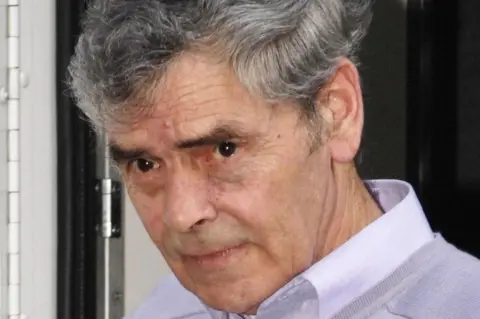 PA Media
PA MediaPeter Tobin was only unmasked as a serial killer after his final victim was discovered hidden under the floorboards of a church in Glasgow.
His arrest, while feigning illness in a London hospital, set in motion a UK-wide investigation which spanned six decades and generated 1,400 lines of inquiry.
Operation Anagram eventually led officers to a garden in Kent, where forensic archaeologists found the remains of two teenagers who had vanished 16 years earlier.
David Swindle, the officer who led the investigation, is convinced that Tobin, who has now died, killed many more.
The murder of Angelika Kluk
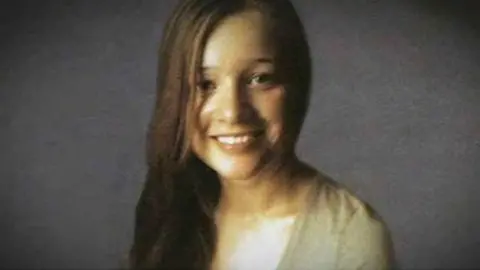
Angelika Kluk was working as a cleaner at St Patrick's church in Anderston, Glasgow, when she vanished on 24 September 2006.
The Gdańsk University undergraduate, who had spent the summer in Scotland to fund her language studies, was reported missing by her boyfriend.
Suspicion soon fell on three men, including a slightly-built church handyman called Pat McLaughlin.
Angelika, who McLaughlin described as his "wee apprentice", had been helping him paint a shed on the day she disappeared.
But hours after he was questioned by police, the 60-year-old vanished.
Within days, McLaughlin's picture was released to the media and officers took a phone call that changed the whole dynamic of the investigation.
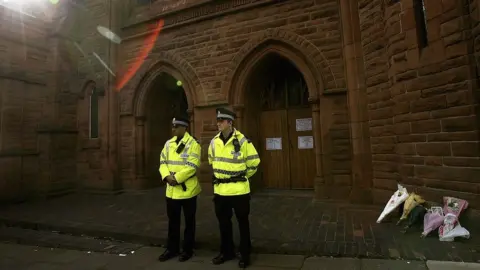 Getty Images
Getty ImagesA woman told police the missing suspect was using a false name. Pat McLaughlin was convicted sex offender Peter Tobin, who had been off the radar for almost a year.
During a search of the church, an expert noticed an imperfection in the floor which exposed a hatch, 28in by 18in. It covered a vault containing Angelika's body.
A post-mortem examination later revealed she had been bound and gagged, raped, beaten with a piece of wood and stabbed in the chest 16 times.
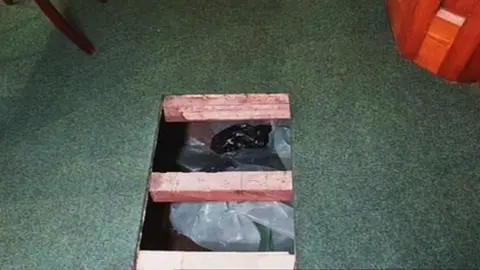
The frenzied nature of the attack suggested the killer was not a first offender.
Mr Swindle told BBC Scotland: "When I saw the injuries on her I thought: 'He has done this before.' You don't get to that age and kill for the first time."
The detective also had a hunch that the person responsible may have intended to move and bury the body.
DNA recovered at the scene produced a match on the UK National Criminal Intelligence Database for Peter Tobin, who had been convicted of raping two 14-year-old girls in Havant, Hampshire, in 1994.
After 10 years in prison he had returned to Renfrewshire, where he was born and brought up.
In October 2005 he attacked a neighbour in Paisley but could not be traced.
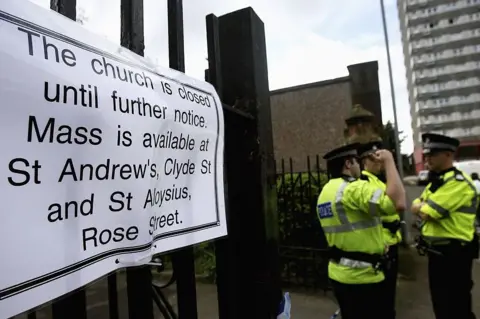 Getty Images
Getty ImagesAfter Angelika's murder, Tobin moved to London, where he used another false name in a bid to cover his tracks.
PC Alan Murray was sent to a hospital where a nurse had recognised a patient from the media coverage. He had told doctors he was pipe fitter James Kelly.
When PC Murray asked: "Are you..." the man interrupted and said: "Peter Tobin. You have been looking for me."
Tobin was initially arrested for breaching the terms of the sex offenders' register, which gave officers time to build a forensic case against him.
His DNA was found on Angelika's body and at the scene. He was also linked by samples on his watch and the T-shirt he was wearing in hospital.
In March 2007 Tobin went on trial at the High Court in Edinburgh, where, after six weeks of evidence, the jury took just under four hours to find him guilty.
Lord Menzies described his actions as "inhuman" and ordered him to serve a minimum of 21 years in jail.
Operation Anagram
Within days of Tobin's arrest, Strathclyde Police covertly launched Operation Anagram.
From the outset it had to be shrouded in secrecy amid fears any media leaks could prejudice live proceedings in the Kluk case.
Led by Det Supt Swindle, the team's task was to chronicle the nomadic life of Peter Britton Tobin.
From his birth in Johnstone, Renfrewshire, on 27 August, 1946, to his arrest for Angelika's murder, police set out to map his movements across the UK.
Mr Swindle said: "The concept of Anagram was basically to look at Tobin as a serial killer.
"The only way we could do that was to look at his life and where he had been over the years and start to build up a timeline."
Officers, researchers and analysts joined the painstaking task, examining everything from his jobs and cars to his friends and relationships.
 PA
PA This was complicated by the fact Tobin had as many as 60 addresses and is thought to have used up to 40 aliases.
Officers also managed to link him to 38 mobile phone SIM cards.
The team slowly began to compile a detailed picture of Tobin's life.
He was brought up in Renfrew, where he lived with his engineer father Daniel, mother Marjorie and seven siblings.
As a child, he spent time in borstal and by his teens he was a petty criminal who specialised in theft and forgery.
Tobin was married three times but each relationship collapsed after a catalogue of domestic abuse.
 Getty Images
Getty ImagesHis third wife, Cathy Wilson, would later recall he was "charming and funny" but became violent after she moved into his Brighton flat in the autumn of 1986.
She gave birth to their son, Daniel, in December 1987. They married two years later but after moving to Bathgate, West Lothian, the relationship ended.
At the time, Tobin was travelling the country fitting insulation panels.
The Anagram team charted his whereabouts and compared them with unsolved murders.
The first coincidence was linked to one of Scotland's most perplexing cold cases.
The disappearance of Vicky Hamilton
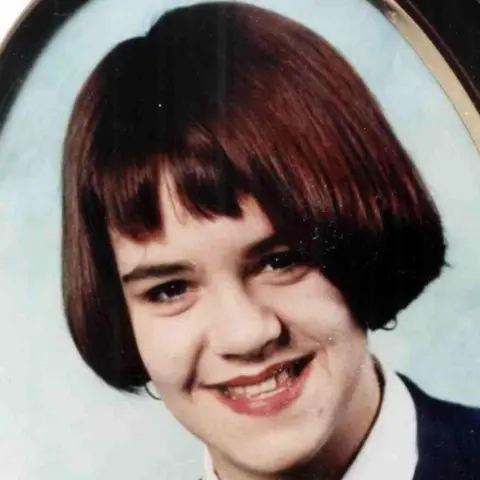 PA Media
PA MediaOn 10 February 1991, Vicky Hamilton hugged her big sister for the last time at a bus stop in Livingston, West Lothian.
The 15-year-old made the short journey to Bathgate, where she bought a bag of chips before setting off to catch a connecting service to her home in Redding, Falkirk.
But she never arrived.
Eleven days later Vicky's purse was found in a gutter in Edinburgh's St Andrew's Square.
There were fears she had run away, but the truth was more chilling.
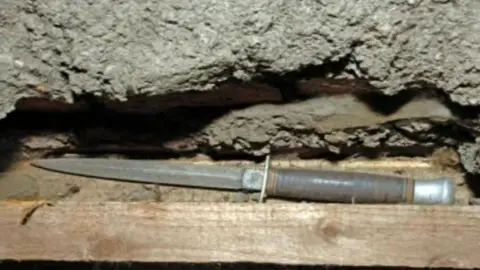 Crown Office
Crown OfficeThe Anagram team established that when Vicky vanished Tobin was unemployed and living alone, just over a mile away, in Robertson Avenue, Bathgate.
They alerted Lothian and Borders Police, who already had a cold case team assigned to the inquiry.
On 4 June 2007, officers searched the property and recovered a five-inch dagger-style knife hidden in the loft space.
It was later found to have traces of Vicky's DNA - but there was no sign of her.
Mr Swindle said: "The theories about Tobin were coming true but, at that time, we still did not know where Vicky was."
The search for Dinah McNicol
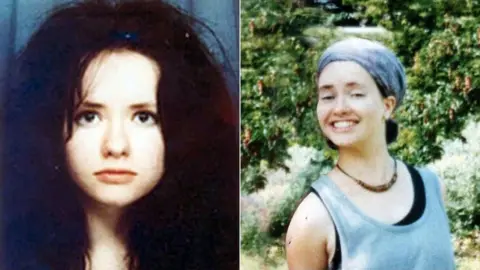 Essex Police
Essex PoliceThe Anagram team was working to establish whether Tobin could have been in an area where 18-year-old Dinah McNicol went missing.
The student was last seen on 6 August 1991 when she and friend David Tremlett hitched a lift home from the Torpedo Town music festival in Liphook, Hampshire.
David was dropped off by the driver, who had a Scottish accent, near junction 8 of the M25 at Reigate, Surrey.
But Dinah, from Tillingham, Essex, stayed in the car.
At the time, Tobin was living in Irvine Drive, Margate. He took up the tenancy on 25 March 1991 - six weeks after Vicky vanished.
Inquiries led detectives to former neighbour David Martin, who told officers "Scottish Pete" was a normal guy who had custody his young son at weekends.
But one recollection proved critical.
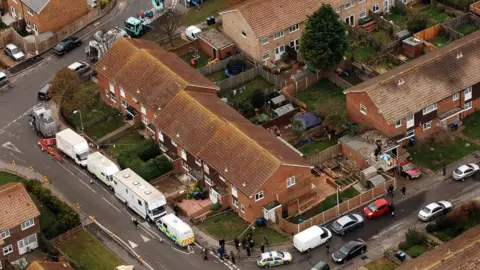 PA
PAMr Martin later told a jury he saw his neighbour digging a massive hole in his garden.
"I said what are you doing Pete? You going for Australia? And he said 'no', he said: 'I'm digging a sandpit for the lad when he comes up, somewhere for him to play'.
"And then about two days went by and it was all filled in and flattened off."
Police obtained a warrant and radar was used to detect any anomalies, leading to a discovery on 12 November 2007.
Mr Swindle was getting ready for a gala ball in Glasgow when he was contacted by Det Sup Tim Wills from Sussex Police, who told him a body had been found.
"I said: 'That will be Dinah then. That's sad but it's good for you.'
"He said: 'No. It's not Dinah. It's Vicky Hamilton'."
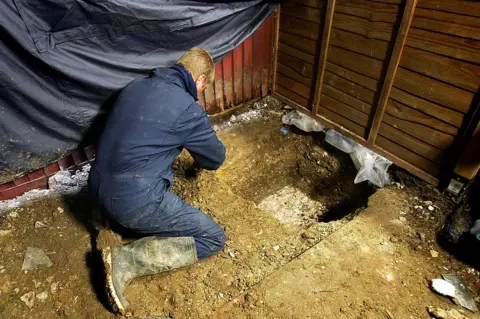 Getty Images
Getty ImagesOfficers had initially identified Vicky - reported missing 400 miles away - from her clothes.
Evidence suggested she had been the victim of a serious sexual assault and was possibly strangled before her body was dismembered, driven across the border and buried in Tobin's garden.
Dental records were used to formally identify the teenager, who still had her late mother's rings on her fingers.
Tobin's DNA was found on a plastic bag containing Vicky's upper torso. His son's DNA was found on the purse which had been found in Edinburgh, suggesting that the then three-year-old had been given it to play with.
The month-long trial also heard amitriptyline, an anti-depressant with sedative side effects, was found in Vicky's liver.
Tobin was convicted of murder in December 2008 and sentenced to a minimum of 30 years in prison.
Judge Lord Emslie said the crime was "among the most evil and horrific acts that any human being could commit".
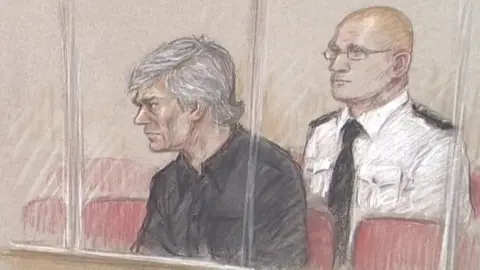 PA
PA A year later, Tobin went on trial for Dinah's murder at Chelmsford Crown Court.
Jurors heard that her body was also found, bound and gagged, in the garden of Tobin's former home in Margate.
His fingerprints were found on some of bin bags used to wrap Dinah's body.
Traces of an anti-depressant, sleeping pills and cannabis were found in her liver. Tobin had stolen more than £2,000 from Dinah's building society account.
It took less than 15 minutes to return a guilty verdict. Judge Mr Justice Calvert-Smith said Tobin should never be released from prison.
Were there more victims?
 Essex Police
Essex PoliceDespite being linked with many unsolved cases, Tobin has never co-operated with police.
The void has been filled with speculation, but David Swindle would not be drawn on names of potential victims out of respect for the families.
Tobin has been mentioned in connection with the Bible John killings, a series of murders that brought terror to Glasgow in the late 1960s.
But Mr Swindle said there was no evidence to indicate that Tobin was "the so-called serial killer".
There are doubts that the murders of Patricia Docker, 25, Jemima McDonald, 32, and Helen Puttock, 29, were committed by the same man.
The only forensic clue that exists for the cases, a semen stain on Ms Puttock's tights, does not match Tobin's DNA.
 BBC Crimewatch
BBC CrimewatchIn 2009, police released photographs of 32 pieces of jewellery which were in Tobin's possession between 1991 and 2006.
They had not been claimed by his three ex-wives and police believe they may have been kept as trophies from other unknown victims.
The following year, specialist searches were carried out at locations linked to Tobin in Brighton and Portslade, but nothing was found.
However, Mr Swindle is convinced that Tobin, who spent his final years in prison in Edinburgh, took more than three lives.
"Tobin is evil. He has killed other people," he said. "I have no doubt he has been killing since he was young."
He added: "The big thing with Tobin is that the potential victims are missing people, and he buries people.
"If someone goes missing and they don't have a relative to report them missing then how do you know they are missing? They just disappear."
